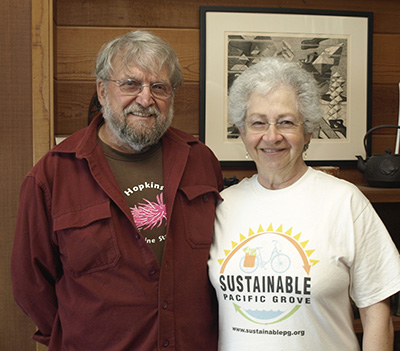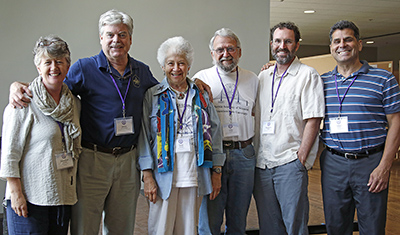John Pearse, a professor emeritus of ecology and evolutionary biology at UC Santa Cruz, and his wife, Vicki, a research associate at UCSC's Institute of Marine Sciences, are among the world's leading experts on marine invertebrates, including the group known as echinoderms which includes the familiar sea stars, sea urchins, and sand dollars.
They were honored for their contributions to the field at the 2017 North American Echinoderm Conference, which took place July 9 to 13 in Worcester, Massachusetts. The conference opened with a plenary session dedicated to recognizing the Pearses for their many contributions to and support of echinoderm research and researchers. Three former students who worked with them as undergraduate or graduate students at UC Santa Cruz gave presentations, followed by talks by both John and Vicki Pearse.
The Pearses have shared their knowledge and enthusiasm for marine invertebrates with a multitude of students and colleagues. The two have worked separately and as a team, and although their studies have focused mostly on the California coast, they have ranged from tropical to Antarctic waters. Since his retirement in 1994, John has continued to teach, conduct research, and write as a professor emeritus affiliated with the Institute of Marine Sciences.
John and Vicki Pearse were both honored in 2008 with a lifetime achievement award from the Western Society of Naturalists. Together with Vicki's parents, Ralph and Mildred Buchsbaum, they revised the classic invertebrate zoology textbook Animals Without Backbones and wrote another, Living Invertebrates, first published in 1987. They coedited the seven-volume treatise Reproduction of Marine Invertebrates and are fellows of the California Academy of Sciences. John Pearse has served as president of the California Academy of Sciences, the Society for Integrative and Comparative Biology, and the International Society of Invertebrate Reproduction. In 2011, he received the California Academy of Sciences Fellows' Medal, its highest honor. Vicki Pearse served as president of the American Microscopical Society and was the founding editor of the journal Invertebrate Biology.
The three former students who gave plenary talks honoring the Pearses were:
- Isidro 'Sid' Bosch, professor of biology at SUNY Geneseo in Geneseo, New York. Bosch received his B.A. in aquatic biology at UC Santa Barbara and his Ph.D. in biology at UC Santa Cruz under the direction of John Pearse. He has been a member of the faculty at SUNY Geneseo since 1992. Bosch has also worked closely with Vicki Pearse, studying larval feeding in the Antarctic and California. He has garnered awards for excellence in both teaching and research and has published a large body of work on both marine and freshwater organisms.
- James B. McClintock, university professor of polar and marine biology at the University of Alabama at Birmingham. McClintock worked with John Pearse as both an undergraduate student and as a National Science Foundation postdoctoral fellow. He received his B.S. degree at UC Santa Cruz and his Ph.D. from the University of South Florida. He became a full professor at UAB in 1997 and has served as dean of the School of Natural Sciences and Mathematics and as interim dean of the Graduate School. McClintock’s research focuses on aspects of marine invertebrate nutrition and reproduction and Antarctic marine chemical ecology. He has been the recipient of numerous awards and distinctions including recognition for excellence in teaching and research.
- Ben Miner, associate professor of biology at Western Washington University. Miner earned his B.A. at UC Santa Cruz and was advised in his research by John Pearse and Grant Pogson. He received his doctorate from the University of Florida and did postdoctoral studies at the UC Davis Bodega Marine Laboratory and Center for Population Biology. His recent research has focused on the underlying causes and ecological ramifications of sea star wasting disease in the Pacific Ocean.




